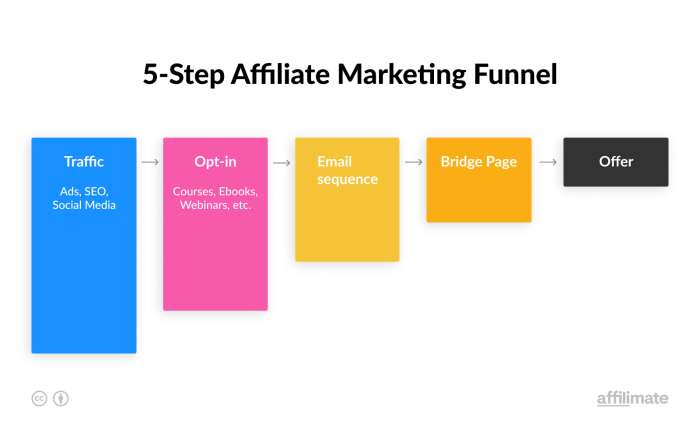Building an Affiliate Marketing Strategy opens the door to a world of digital opportunities, where savvy marketers thrive by leveraging partnerships and innovative tactics. Dive into this dynamic realm to discover the secrets of boosting your online presence and driving revenue like a boss.
Get ready to explore the ins and outs of affiliate marketing, from selecting the perfect programs to crafting killer content and dominating the promotion game. Brace yourself for a wild ride through the ever-evolving landscape of digital marketing.
Understanding Affiliate Marketing
Affiliate marketing is a type of performance-based marketing where a business rewards one or more affiliates for each visitor or customer brought by the affiliate’s own marketing efforts. Essentially, affiliates earn a commission for driving traffic or sales to the business through their promotional activities.
Benefits of Affiliate Marketing for Businesses
- Cost-effective: Businesses only pay for actual results, such as leads or sales, generated by affiliates.
- Expanded reach: Affiliates can help businesses reach new audiences and markets that they may not have access to otherwise.
- Increased brand exposure: Through affiliate partnerships, businesses can enhance their brand visibility and credibility.
- Performance tracking: Affiliate marketing allows businesses to track the performance of their campaigns in real-time, providing valuable insights for optimization.
Examples of Successful Affiliate Marketing Campaigns
- Amazon Associates: Amazon’s affiliate program is one of the most well-known and successful examples of affiliate marketing, where affiliates earn commissions for promoting Amazon products.
- Sephora Beauty Insider: Sephora’s affiliate program rewards beauty influencers and bloggers for promoting their products and driving sales through personalized recommendations.
- Bluehost Affiliate Program: Bluehost offers a lucrative affiliate program for bloggers and website owners to earn commissions for referring customers to their web hosting services.
Setting Goals for Affiliate Marketing: Building An Affiliate Marketing Strategy
Setting clear goals for an affiliate marketing strategy is crucial for guiding your efforts and measuring success. By establishing specific objectives, you can focus on what matters most and track your progress towards achieving them.
Key Performance Indicators (KPIs)
- Determine the number of clicks generated by affiliate links to measure traffic.
- Track the conversion rate to see how many clicks result in desired actions, such as purchases or sign-ups.
- Monitor the average order value to assess the quality of traffic driven by affiliates.
- Analyze the return on investment (ROI) to understand the profitability of your affiliate marketing efforts.
Aligning Goals with Business Objectives
- Ensure that your affiliate marketing goals are in line with your overall business objectives to drive meaningful results.
- Align KPIs with key business metrics, such as revenue targets, customer acquisition goals, or brand awareness objectives.
- Regularly review and adjust your affiliate marketing strategy to stay aligned with evolving business priorities.
Choosing the Right Affiliate Programs
When it comes to choosing the right affiliate programs for your niche, it’s essential to consider a few key factors to ensure success. Here are some tips to help you select the most suitable affiliate programs for your business:
Types of Affiliate Programs
There are different types of affiliate programs, such as pay-per-click (PPC) and pay-per-sale (PPS). Each type has its pros and cons, so it’s important to understand them before making a decision.
- Pay-Per-Click (PPC): With PPC programs, you earn a commission every time a visitor clicks on the affiliate link on your site. This can be a great option if you have high traffic but may not result in as high of a payout as PPS programs.
- Pay-Per-Sale (PPS): PPS programs pay you a commission when a visitor you referred makes a purchase. While the payout may be higher than PPC, it requires a more targeted audience to convert visitors into customers.
Criteria for Evaluating Affiliate Partners
When evaluating potential affiliate partners, consider the following criteria:
- Relevance to Your Niche: Choose affiliate programs that align with your niche and target audience to ensure better conversion rates.
- Commission Structure: Look at the commission rates offered by different programs and compare them to choose the ones that offer competitive payouts.
- Cookie Duration: Check the cookie duration of each program, as this will determine how long you can earn commissions from a referral.
- Reputation and Track Record: Research the reputation and track record of affiliate programs to ensure they are reliable and trustworthy.
- Support and Resources: Consider the support and resources provided by affiliate programs, such as marketing materials and dedicated account managers, to help you succeed.
Creating Compelling Content for Affiliates

Creating engaging content is crucial in driving affiliate conversions. High-quality content not only attracts your audience but also builds trust and credibility, making them more likely to click on your affiliate links. Here are some strategies and best practices for creating compelling content for affiliates:
Utilize Storytelling
Storytelling is a powerful tool in content creation. Share personal experiences, success stories, or case studies related to the products or services you are promoting. This helps create a connection with your audience, making them more inclined to trust your recommendations.
Focus on Value
Ensure that your content provides value to your audience. Whether it’s through educational articles, product reviews, or tutorials, make sure your content is informative and helpful. By offering valuable information, you position yourself as an authority in your niche, increasing the likelihood of conversions.
Integrate Affiliate Links Naturally
Avoid being too promotional or salesy when incorporating affiliate links into your content. Instead, seamlessly integrate them into your text by recommending products or services within the context of your content. This way, your audience is more likely to click on the links as they feel like natural recommendations rather than forced promotions.
Engage with Your Audience, Building an Affiliate Marketing Strategy
Encourage interaction with your audience by asking questions, responding to comments, or creating polls and surveys. Engaging with your audience not only helps build a community but also provides valuable insights into their preferences and interests, allowing you to tailor your content and affiliate promotions accordingly.
Optimize for
Optimizing your content for search engines can help attract more organic traffic to your site, increasing the visibility of your affiliate links. Use relevant s, optimize meta tags, and create high-quality content that provides value to your audience. By improving your , you can reach a larger audience and drive more affiliate conversions.
Promoting Affiliate Offers

When it comes to promoting affiliate offers, it’s essential to explore different channels to maximize your reach and visibility. By utilizing various platforms such as social media and email marketing, you can effectively showcase the products or services you’re promoting and attract potential customers.
Utilizing Social Media
- Use visually appealing content to capture the attention of your audience.
- Engage with your followers by responding to comments and messages promptly.
- Utilize hashtags to increase the discoverability of your posts.
Email Marketing Strategies
- Segment your email list to target specific audiences with relevant offers.
- Create compelling subject lines to increase email open rates.
- Include clear call-to-action buttons that direct readers to the affiliate offer.
Importance of Tracking and Optimization
Tracking and optimizing your affiliate campaigns are crucial for achieving better results. By monitoring key metrics such as click-through rates, conversion rates, and ROI, you can identify what strategies are working and make necessary adjustments to maximize your earnings.
Remember, continuous optimization is key to success in affiliate marketing!
